 Winter is Coming
Winter is Coming
As you face an uncertain winter, what actions can you take to protect your mental health and boost your immunity?
COVID-19 has brought so much uncertainty and uncertainty can be bad for mental health. Plus, you may be feeling anxious about contracting COVID-19. This article suggests daily behaviours you should engage in to promote mental health over the winter and to boost your immunity in case you come in contact with the virus. It reviews how Irish people are coping with COVID-19 and suggests you try new healthy routines over autumn, while the days are still long(ish) and the weather is sometimes good, to prepare for winter 2020.
Because lack of time is such an important barrier to health behaviours, this article encourages you to decide which behaviours are a priority for you. It asks you to imagine an ordinary, healthy day in winter 2020 by asking this very specific question:
It’s bedtime on Friday, the 20th of November. It’s been dark since 5pm. It’s cold, it’s wet but you’ve just had a great, ordinary day. What does that look like for you?
We recommend your day should focus on the factors below. Our rationale is in the full article. But it’s up to you to decide what’s an ordinary, good day for you.
- Social connection

- Will you make social connection your top priority? Who will you make sure you speak to? How will you see them: online, outdoors, indoors? - Physical activity
- Will you exercise for 30 minutes? Will you incorporate movement throughout your day? - Food
- Have you got a plan for your daily meals? Will half of every plate be colour? What strategies will help you drink 6-8 cups of water? - Tobacco
- Will you smoke? If you’ve quit, congratulations! What supports will you be using to make sure you stay quit? - Alcohol
- Will you drink alcohol? If so, where, with whom and how much? If you would like to quit, what support will you use? - Study
- How much study will you do each day? Will you contact your tutor? Do you remember why you chose the course you chose? Does it give you purpose? - Other Activities
- How much sleep will you get and how will you wind down beforehand? What downtime activities are important to you? What will you do just for fun?
This article suggests you should set a specific plan, give yourself time to develop new habits and be proud of yourself if you have a good day and kind to yourself if you don’t.
How has COVID 19 affected health? Some are thriving, others are surviving
Judging by social media, people have adapted to COVID-19 restrictions by doing home workouts and cooking from scratch in between mindfulness and yoga sessions. Or at least that’s how it seems. In the mainstream media, the stories are much darker with people contracting or dying from COVID-19, or loved ones passing away while their families are unable to hug them goodbye. And of course, there’s the fear of the disease, job losses and a looming financial crisis. We think this Central Statistics Office infographic shows that both scenarios are true: some people are surviving while others are thriving.
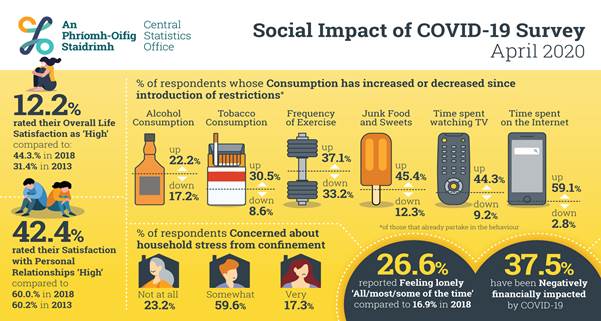
Although a lot has changed since the data for this phase of the COVID crisis were taken six weeks after lockdown in April 2020, it’s a useful point of reference for you to assess how they’re doing relative to the general population.
Six weeks post-lockdown, life satisfaction was classified as high by only 12.2% of the population compared to 44.3% in 2018. Unfortunately, the rumours of COVID divorces may be true with only 42.2% rating their personal satisfaction with personal relationships as ‘High’ compared to over 60% in both 2018 and 2013. Over three quarters of people are at least somewhat concerned about household stress from confinement, although a quarter aren’t, a quarter of people feel lonely all/most or some of the time and nearly 40% have been negatively affected financially. It’s a very mixed picture.
And the health behaviours themselves are varied. Certainly, sedentary behaviour is more prevalent with greater time spent on the internet and watching television and although over a third of people are exercising more, almost a third are exercising less. While Instagram feeds seem to be filled with quarantinis and wine o’clock jokes, actually 17% are drinking less alcohol although 22% are drinking more. Finally, tobacco use has risen by over a third with only 9% smoking less.
From this data, really all we can conclude, is that different people have reacted differently since the COVID-19 lockdown. But it’s useful to take stock of how others are behaving and see if it tallies with your own experience as it is now, and as you want it to be in winter 2020.
So, what are the priority health behaviours for mental health and immunity?
The recommendations below are based on the best available evidence on health behaviours for mental and physical health in general, not specifically for COVID-19.
Social connection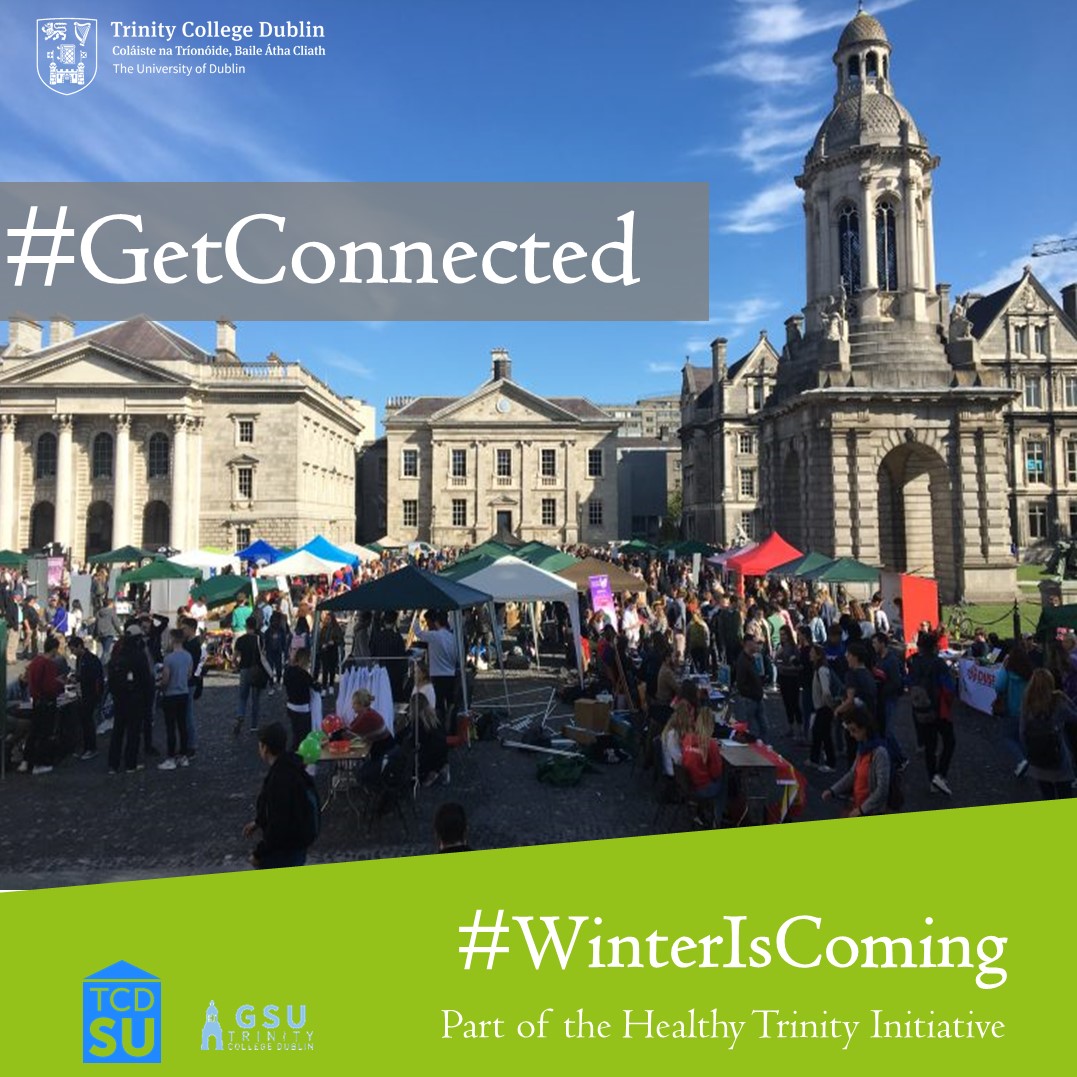
“The primary protective factor consistently recognised in both research
and evidence-based practice is that of social supports.”
HSE Guidance Document (2014)
Mental health
Having social support buffers the effects of stress and can reduce the prevalence of distress and psychological symptoms, including depression and anxiety. Lack of social support is proven to be one of the strongest risk factors for post-traumatic stress disorder. Even when there isn’t a pandemic, social isolation is associated with a higher risk of depression, anxiety, schizophrenia, suicide, dementia and Alzheimer's disease.
Immunity
Unfortunately, to protect our immunity, social connection during COVID-19 must be limited. When meeting others, the basics matter: not too many people, wear a mask and wash your hands. Both indoors and outdoors you should keep 2 metres apart and meeting outdoors is a good idea because there’s a lower chance of infection.
Daily priority:
- Get connected
Make social connection your absolute priority every, single day. Call your mother, phone a friend, walk with a neighbour, chat to a shopkeeper. Whilst meaningful relationships are more beneficial to health, social interaction even with strangers can be helpful.
- Stick to the basics
Wear a mask indoors, wash your hands, keep 2 metres apart.
- Socialise outdoors if possible
As the Norwegians say, there’s no such thing as bad weather, only bad weather. Find good rain gear and layer up. This article is an interesting read.
Physical activity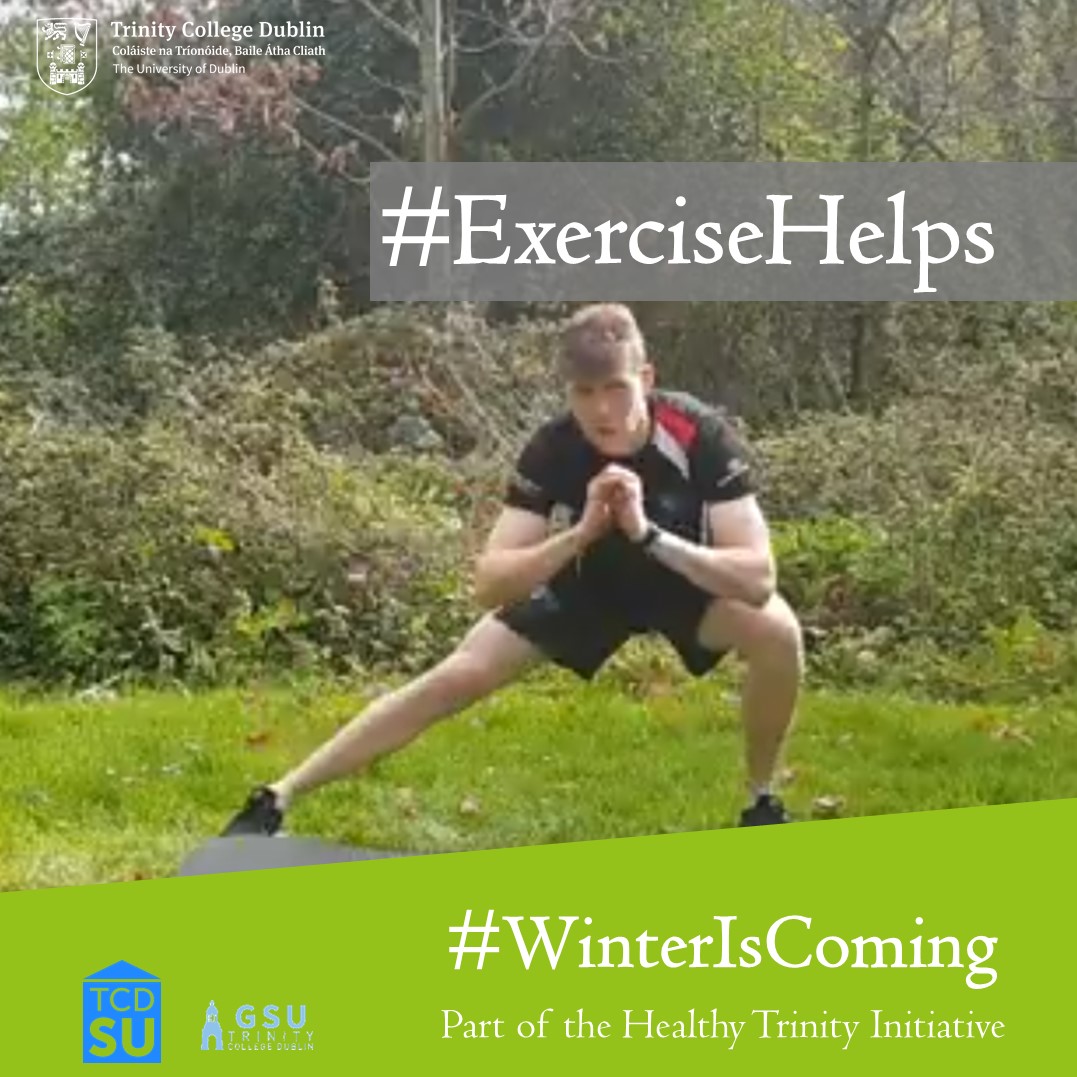
Mental health
A survey by Trinity researchers assessed physical activity during the COVID lockdown and found that the biggest motivations for exercising were mental health benefits. This Spanish study shows that those who exercise during the initial phases of the COVID-19 lockdown had lower perceived anxiety and worry and there is strong evidence that physical activity reduces anxiety and depression.
But while exercising once a day is very important, some evidence suggests sitting for long periods is associated with anxiety. Plus, if you’re on a screen while sitting, there is more evidence of a detrimental effect on mental health. So, stepping away from screens and moving throughout the day is important.
Immunity
There is evidence that moderate exercise boosts your immune function in those with low levels of exercise or with sedentary lifestyles. Whilst acknowledging the lack of COVID-19 specific data, this article is a useful discussion of immunity and COVID-19.
Daily priorities:
- Get 30 minutes moderate intensity physical activity almost every day.
The Irish Sports Monitor (2019) shows that personal exercise is the most popular type of exercise in Ireland (16%) followed by swimming (8%), running (7%) and cycling (4%). The best type of exercise is the one you enjoy.
Trinity Sport’s YouTube channel is packed with workouts, the Healthy Trinity YouTube channel has physiotherapy led pilates and stretching workouts and of course YouTube is full of exercise videos by people like Adriene for Yoga or Joe Wicks for HIIT.
- Move all day
There are very few evidence based recommendations on reducing sedentary behaviours but suggestions for moving all day from the Healthy Trinity team include sitting and standing with your core engaged, taking the stairs wherever possible, taking a break for five minutes in every hour, take every opportunity to move throughout the day for example doing lunges while the kettle boils or taking phone calls standing up.
Food 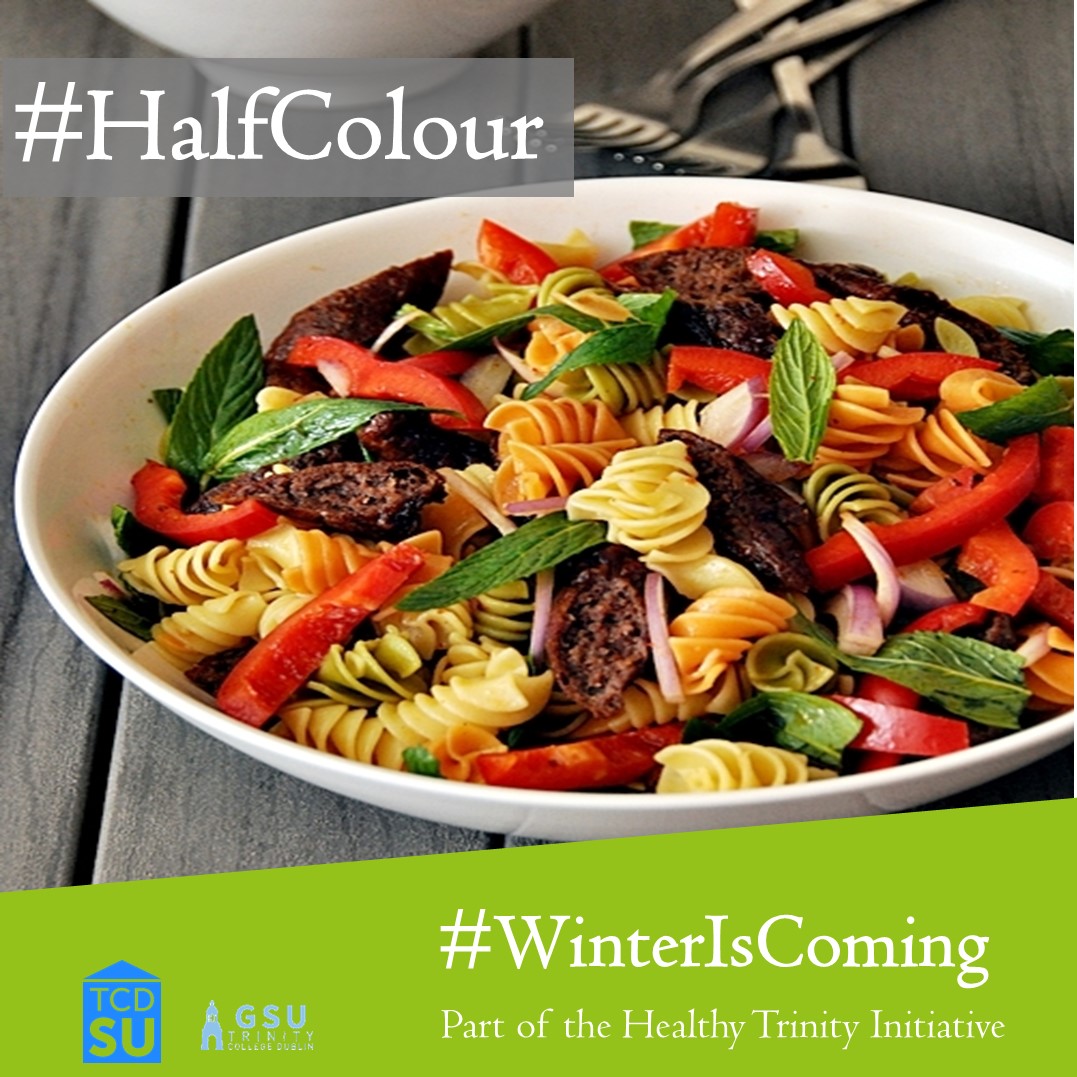
Mental Health
Eating fruit and vegetables has been associated with positive mental health outcomes. One study reported that eating fruit and vegetables yesterday and today can predict good mood today. Another study suggests there is a dose response, so the more fruit and vegetables you eat, the better chance you have of it putting you in a good mood.
Drinking water has been associated with decreased risk of depression and anxiety. Water is the best drink recommended by health authorities in Ireland, but of course a comforting cup of tea or coffee (recommended as healthy in some countries) – maybe with a friend on a Zoom call – is positive for your mental health too.
Immunity
Consumption of fruit and vegetables is associated with better immunity in general. Over winter 2020, eat plenty of fresh fruit and vegetables and drink enough water. If you’re not eating enough fresh fruit and vegetables, consider taking vitamin C and D supplements to boost your immune system.
Daily priority
- Could half of every plate be fruit and/or vegetables?
Add fruit to your breakfast, lettuce leaves to your lunch and make sure half of your dinner is colourful i.e. fruit and vegetables. The same should apply if you’re eating out.
- Drink water
Aim for 6-8 glasses spread across the day
Tobacco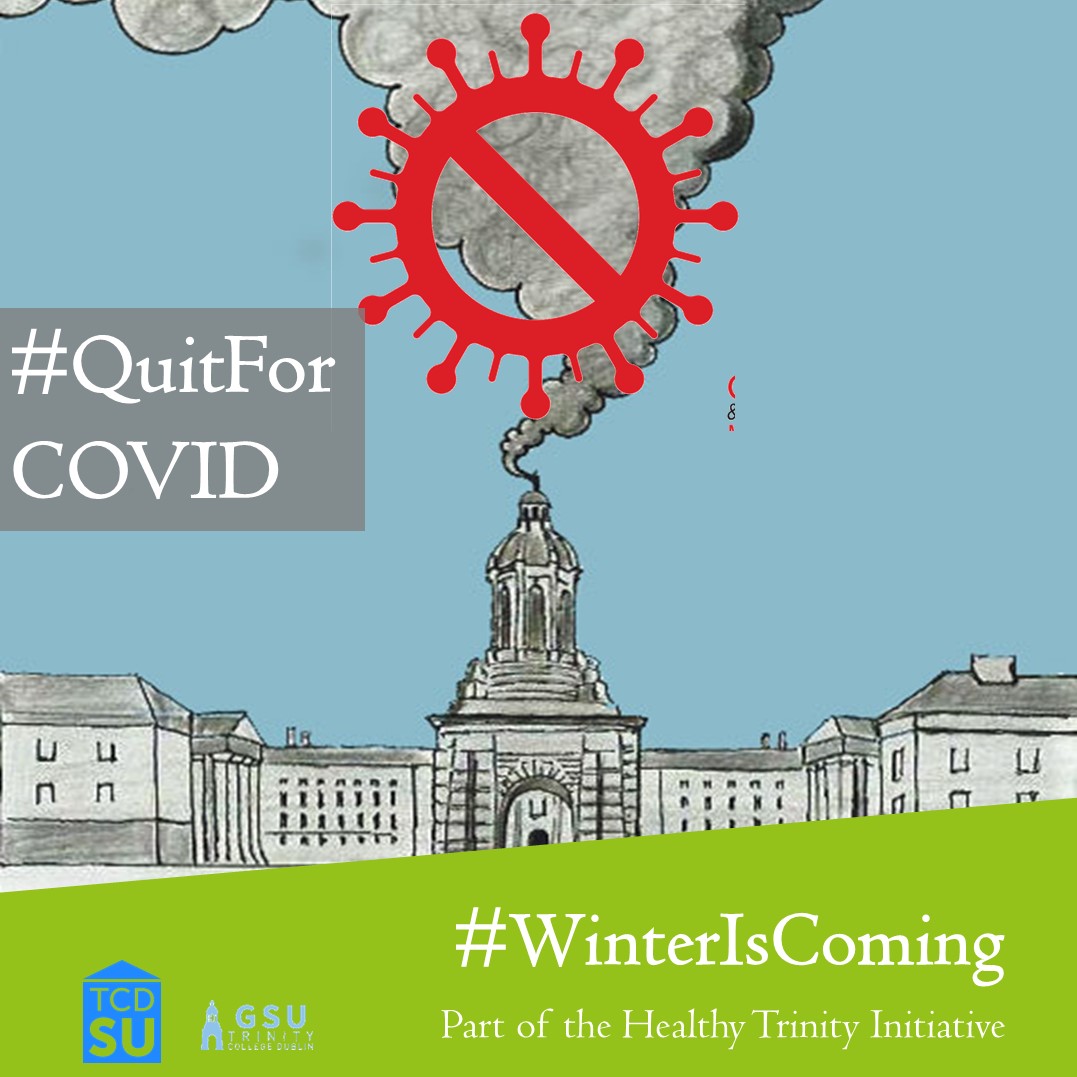
Mental health
Those who smoke are more likely to experience mental health difficulties and the more a person smokes the more likely they are to be affected. Unfortunately, smoking rates amongst people with mental health problems are at least 50% higher than in the wider population. The good news is that stopping is associated with reduced depression, anxiety, stress and improved mood and quality of life compared with those who continue to stop. Even better, the same benefits are seen in those with underlying mental health issues.
Immunity
Smoking is associated with reduced immunity and causes respiratory tract disease. Emerging evidence on COVID-19 suggests smoking is associated with increased severity of disease and death in hospitalized COVID-19 patients. The World Health Organisation recommends stopping smoking during the COVID-19 pandemic.
Daily priority
- Stop smoking
There’s nothing more important for your physical health. You can get support within Trinity by emailing health.promotion@tcd.ie or on multiple platforms here.
Alcohol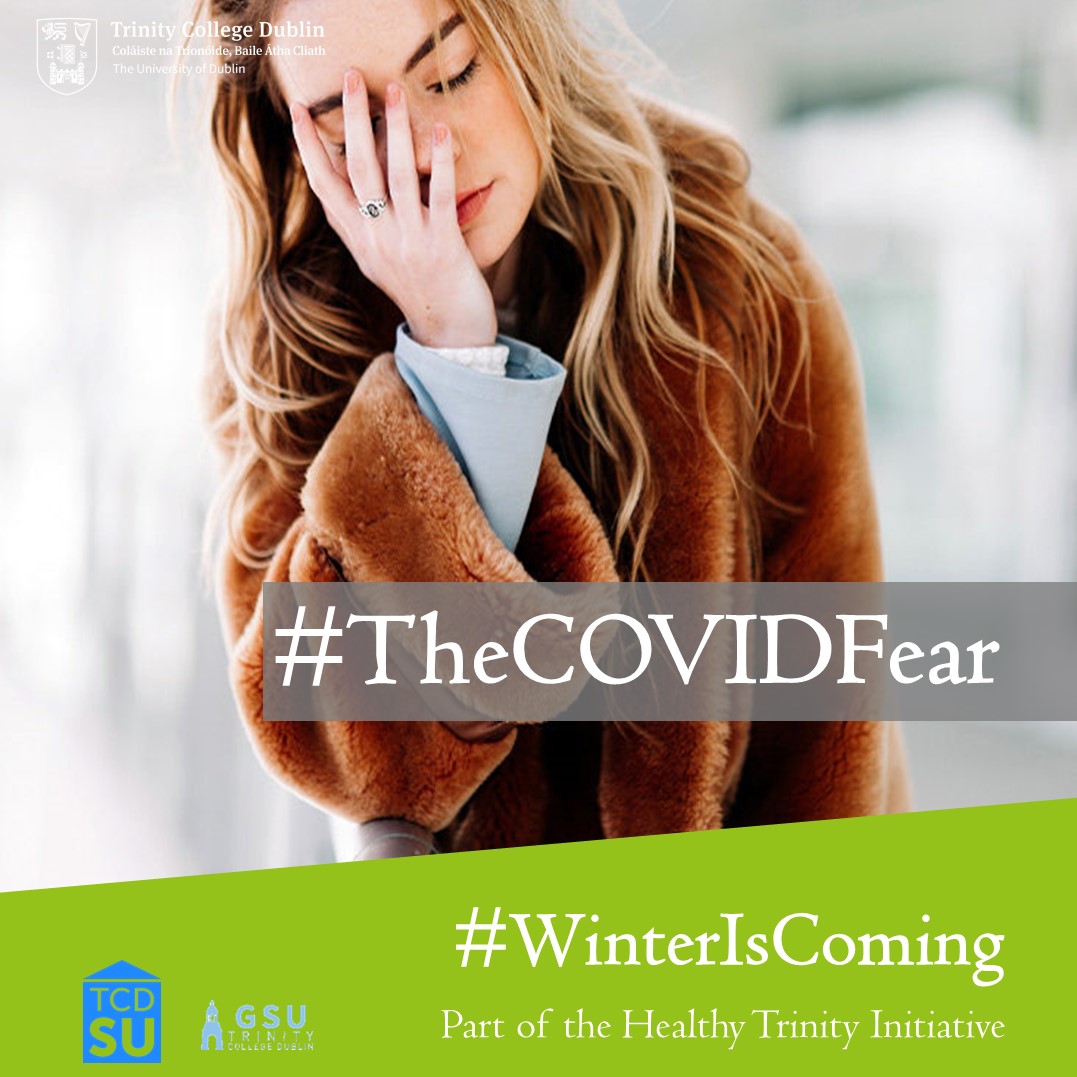
Mental Health
Many people use alcohol to cope with anxiety despite evidence that alcohol contributes to anxiety and depression. This relationship is so well established, we even have slang terms for “the fear” and “post-session depression.” If you choose to drink alcohol, the recommendations for avoiding harm are one standard drink for women per day and two for men.
Immunity
Alcohol can impair the body’s immune system, even during a single episode of binge drinking.
Daily priority
- Decide if you’re going to drink.
If you choose to drink alcohol, how much will you drink?
- Monitor your mood
Pay attention to your mood in the days following drinking. Is your mood negatively affected? Are the aftereffects worth what you gain from drinking?
- Support to quit
Trinity’s has an addiction group. To join, email student.counselling@tcd.ie. For other supports see here.
Study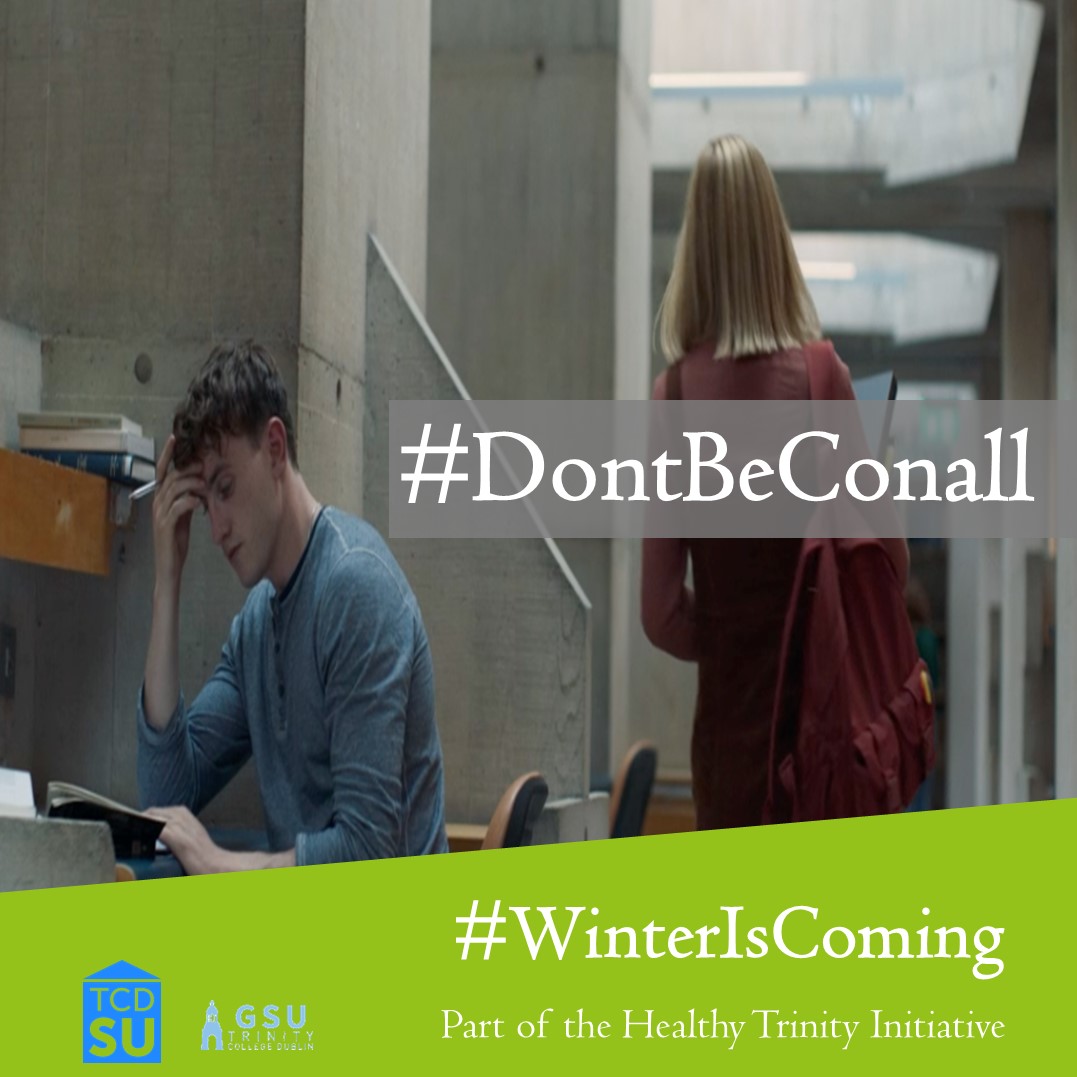
Mental health
Having a purpose in life is very health promoting so if you find the course you’re studying meaningful, you are likely to have better health outcomes across the life course. Indeed, having a third level education means that by the age of 30, you will live four years longer than someone who doesn’t have it.
There is some evidence to suggest that having a balance between the demands and your ability to control how much you are asked to do is important. If the demands of study are too much, the associated stress is linked to higher risk of mental and physical ill health. It's important to set limits to how many hours you study though. Don't be Conall. (Sorry, we had to include a Normal People reference).
Daily priority
- Find purpose in your study
Remind yourself why you chose your course and know that doing something that matters to you, is good for your health
- Set working hours and stick to them
Decide how many hours you will study on an ideal day and try to stick to it
- Work with your tutor
Make contact with your tutor. They’re there to support you.
Other activities
This list hasn’t even mentioned other essential daily activities like sleeping, caring for others, housework, personal hygiene or activities we do for enjoyment like meditation, dossing, knitting, reading, scrolling through drivel on social media. To be pragmatic, it’s a good idea to allow time for these too.
So how should you change your behaviour?
Ask yourself specific questions to set a specific plan
If you were being Motivationally Interviewed you would be asked very specific questions designed to encourage you to talk about changing behaviour. The interviewer would ask you what you’re going to do, rather than telling you what to do. It’s effective.
So, here’s a specific question:
It’s bedtime on Friday, the 20th of November. It’s been dark since 5pm. It’s cold, it’s wet but you’ve just had a great, ordinary day. What does that look like for you?
Here’s what it should include if you want it to focus on mental health and immunity:
- Social connection
- Will you make social connection your top priority? Who will you make sure you speak to? How will you see them: online, outdoors, indoors? - Physical activity
- Will you exercise for 30 minutes? Will you incorporate movement throughout your day? - Food
- Have you got a plan for your daily meals? Will half of every plate be colour? What strategies will help you drink 6-8 cups of water? - Tobacco
- Will you smoke? If you’ve quit, congratulations! What supports will you be using to make sure you stay quit?
- Alcohol
- Will you drink alcohol? If so, where, with whom and how much? If you would like to quit, what support will you use?
- Study
- How much study will you do each day? Will you contact your tutor? Do you remember why you chose the course you chose? Does it give you purpose?
- Other Activities
- How much sleep will you get and how will you wind down beforehand? What downtime activities are important to you? What will you do just for fun?
Prepare for two weeks
Changing behaviour takes planning and some trial and error. Before making a change in behaviour, typically two weeks of preparation is recommended. So for example, if you were thinking of starting to exercise more or reduce your alcohol intake, it is recommended you spend about two weeks working through how your new healthy routine will look, getting any equipment you may need or removing any temptation from your home. During that time, it is recommended you continue to engage in the behaviour you want to change but spend time thinking about what you like or don’t like about your current routine.
Taking sedentary behaviour and alcohol as examples, you should be asking yourself questions like:
- Am I happy with sitting on the couch on my phone for hours or waking up feeling tired or sick from the alcohol I drank the night before?
- What are the reasons I sit on the couch or drink every evening? Is it boredom, tiredness, habit, loneliness?
- When am I most likely to sit on the couch/drink more than I’d like to and what new behaviours can I try out to prevent me from doing that?
- What strategies can I try out over the next two weeks that will help me to be more active or to drink less?
It’s a good idea to write down why you want to change so you can remind yourself when motivation is low.
Accept relapse as a natural part of change
Central to trying new behaviours is accepting relapse as a natural part of changing. Rather than feeling bad for relapse, you should see it as an opportunity for learning (an obnoxiously positive thing to say we know, but in the right circumstances, a learning mindset can be good for mental health). Congratulate yourself for trying and figure out what you can do to prevent relapse happening again. This might be the time you learn to allocate a specific amount of time per day to study/work and stick to it, or that you need to contact your tutor or line manager for support to manage your workload.
Watch out for barriers, especially lack of time
It is more important to focus on what is stopping you from achieving your goals than trying to motivate yourself to overcome difficulties. Focus on what you can do to reduce or remove that barrier. Irish people cite lack of time as an important barrier to certain health behaviours. Prioritisation is the only way around that.
Self-talk
This study found some evidence for self-talk as an effective tool in managing COVID-19 anxiety. Speaking positively and congratulating yourself for effort is widely used in behaviour change and is proven to be effective in sport.
We think the national COVID-19 messaging has generally been kind. Campaigns focused on us all being “In This Together” or “Masking for a Friend” speak to solidarity and gentle persuasion. Given that we know what makes us healthy is much broader than our own health behaviours, we think it’s important to acknowledge for some, this pandemic is harder than others. We welcome the kind tone of messaging and encourage you to be kind to yourself.
If you need help: Be Conall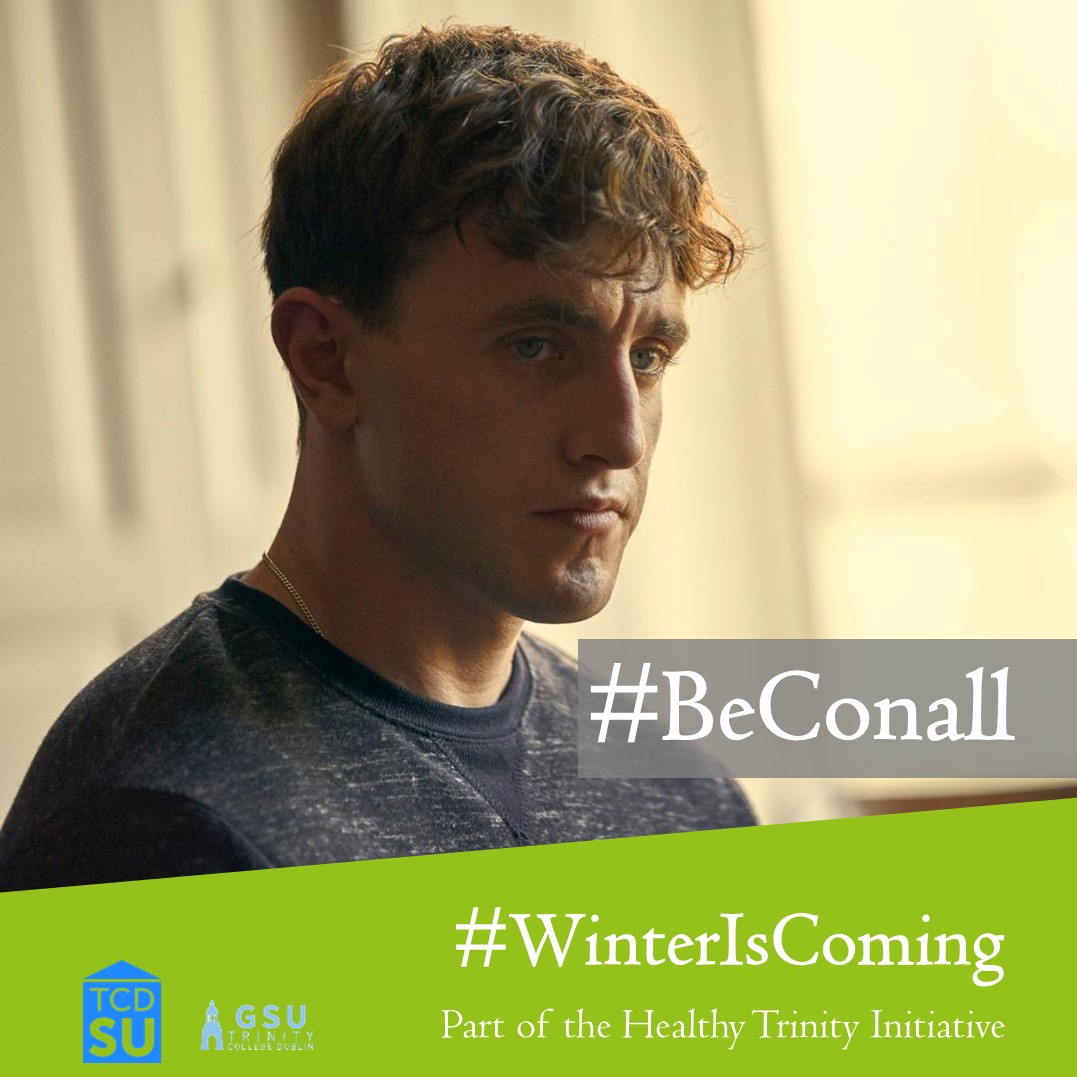
The article above is targeted towards people who are generally well. If you are feeling unwell, there are many services available and it’s important you use them if you need help. Students and staff should speak to their GP if you have COVID-19 symptoms. If you are experiencing mental health difficulties, students should email student.counselling@tcd.ie and staff can speak to the Employee Assistance Programme. The HSE has a text line with trained crisis volunteers: Text 50808, the HSE Drugs and Alcohol helpline is on 1800 459 459, you can find support to stop smoking here.
We apologised above for using a Normal People reference but we're obviously not sorry because we're doing it again here. When he had mental health difficulties, Conall used Trinity's services. We want you to do the same. Be Conall.
References
- CSO (April 2020) Social Impact of COVID 19 Survey April 2020. Available from https://www.cso.ie/en/releasesandpublications/ep/p-sic19/socialimpactofcovid-19surveyapril2020/changesinconsumption/
- HSE (2014) Psychosocial and mental health needs following major emergencies. A guidance document. Available from https://www.hse.ie/eng/services/publications/mentalhealth/emer.pdf
- Spring, B., Moller, A.C. & Coons, M.J. (2012) Multiple health behaviours: overview and implications. doi:10.1093/pubmed/fdr111
- Aked, J., Marks, N., Cordon, C. & Thompson, S. (2008). Five Ways to Wellbeing: A report presented to the Foresight Project on communicating the evidence base for improving people’s well-being. London: New Economics Foundation.
- Harvard Medical School (2020) How to boost your immune system available from https://www.health.harvard.edu/staying-healthy/how-to-boost-your-immune-system
- Stranges S, Samaraweera PC, Taggart F. (2014) Major health-related behaviours and mental well-being in the general population: the Health Survey for England. Available from: https://bmjopen.bmj.com/content/4/9/e005878
CSO (April 2020) Social Impact of COVID 19 Survey April 2020. Available from https://www.cso.ie/en/releasesandpublications/ep/p-sic19/socialimpactofcovid-19surveyapril2020/changesinconsumption/

